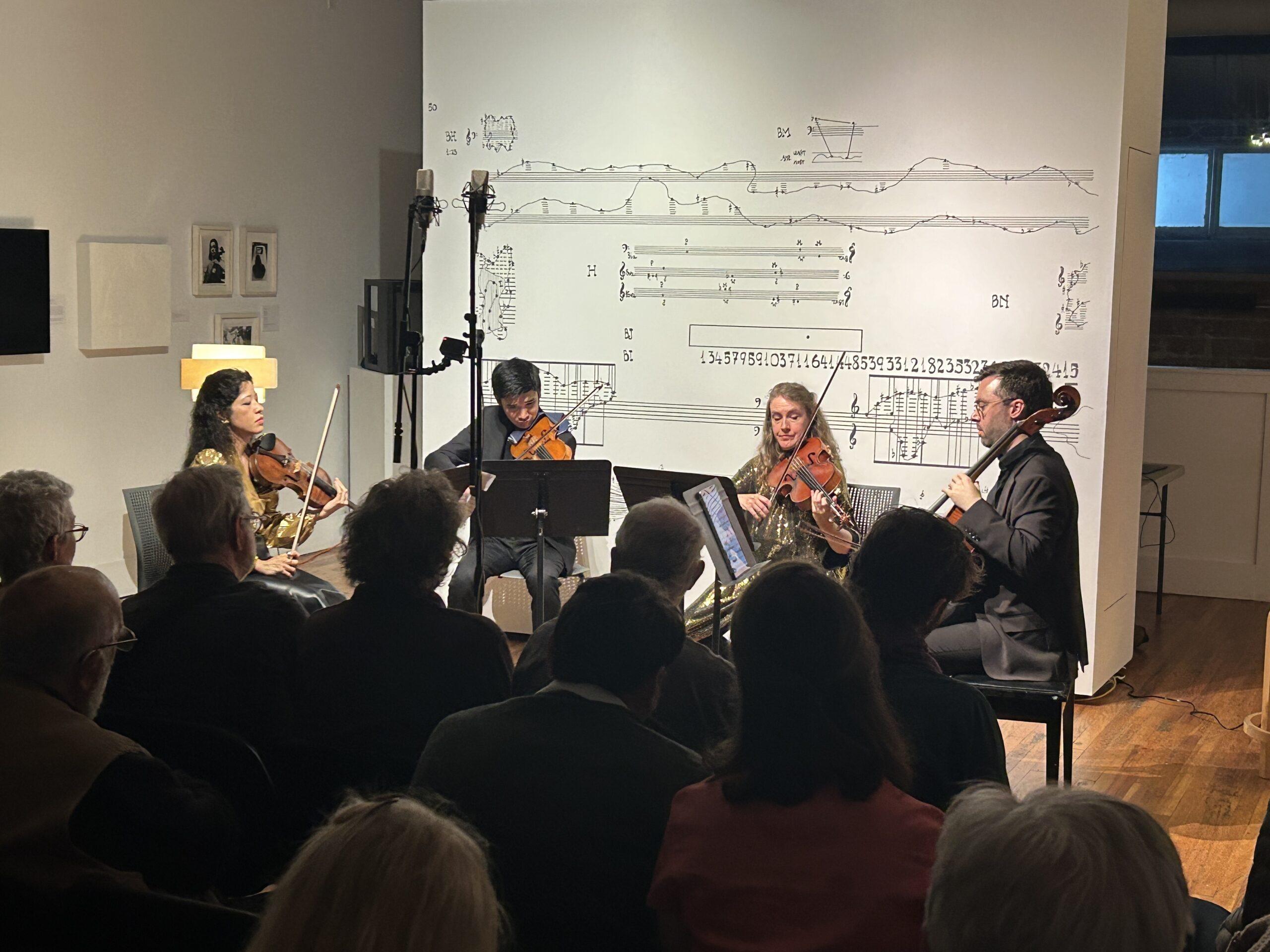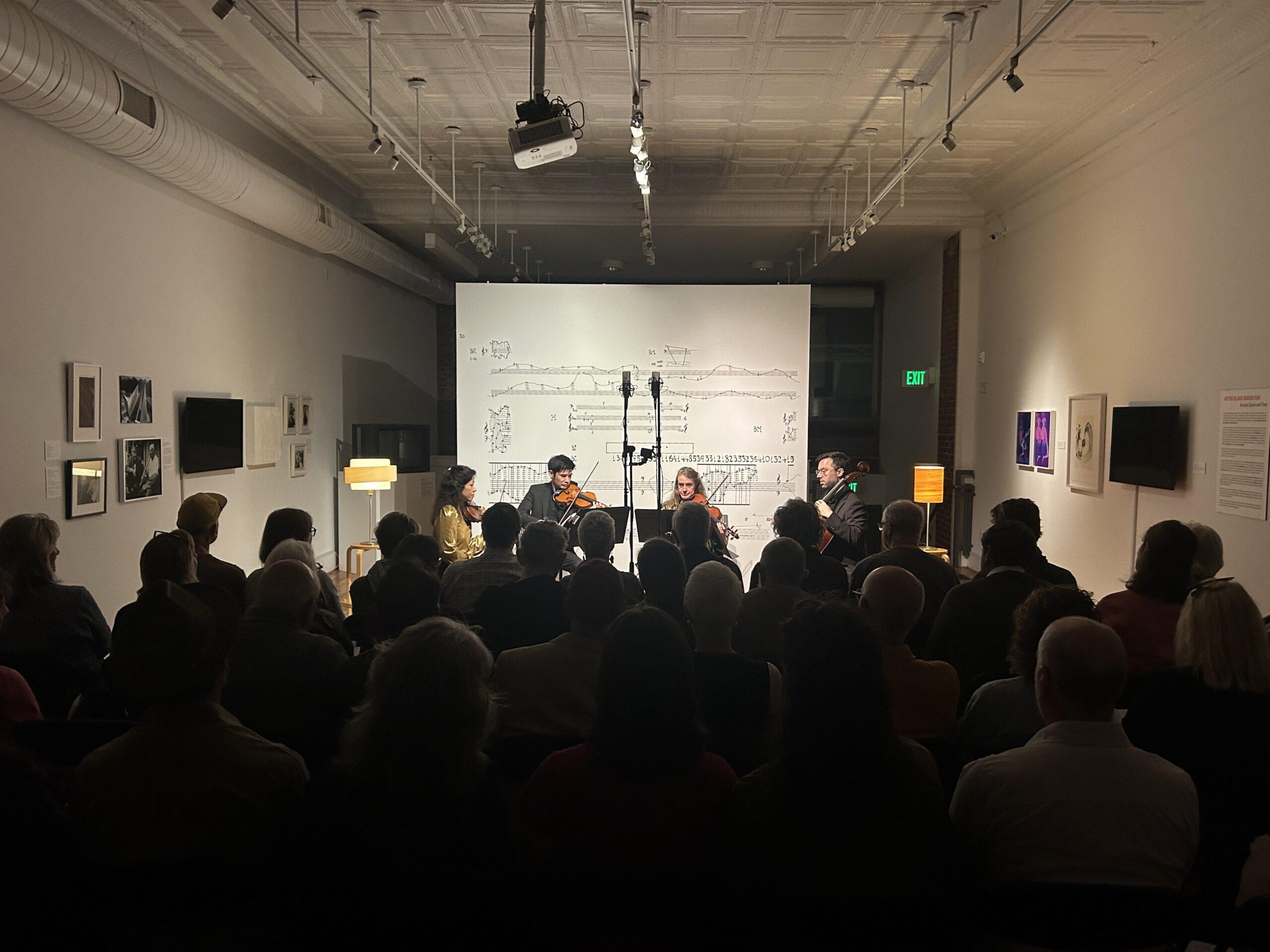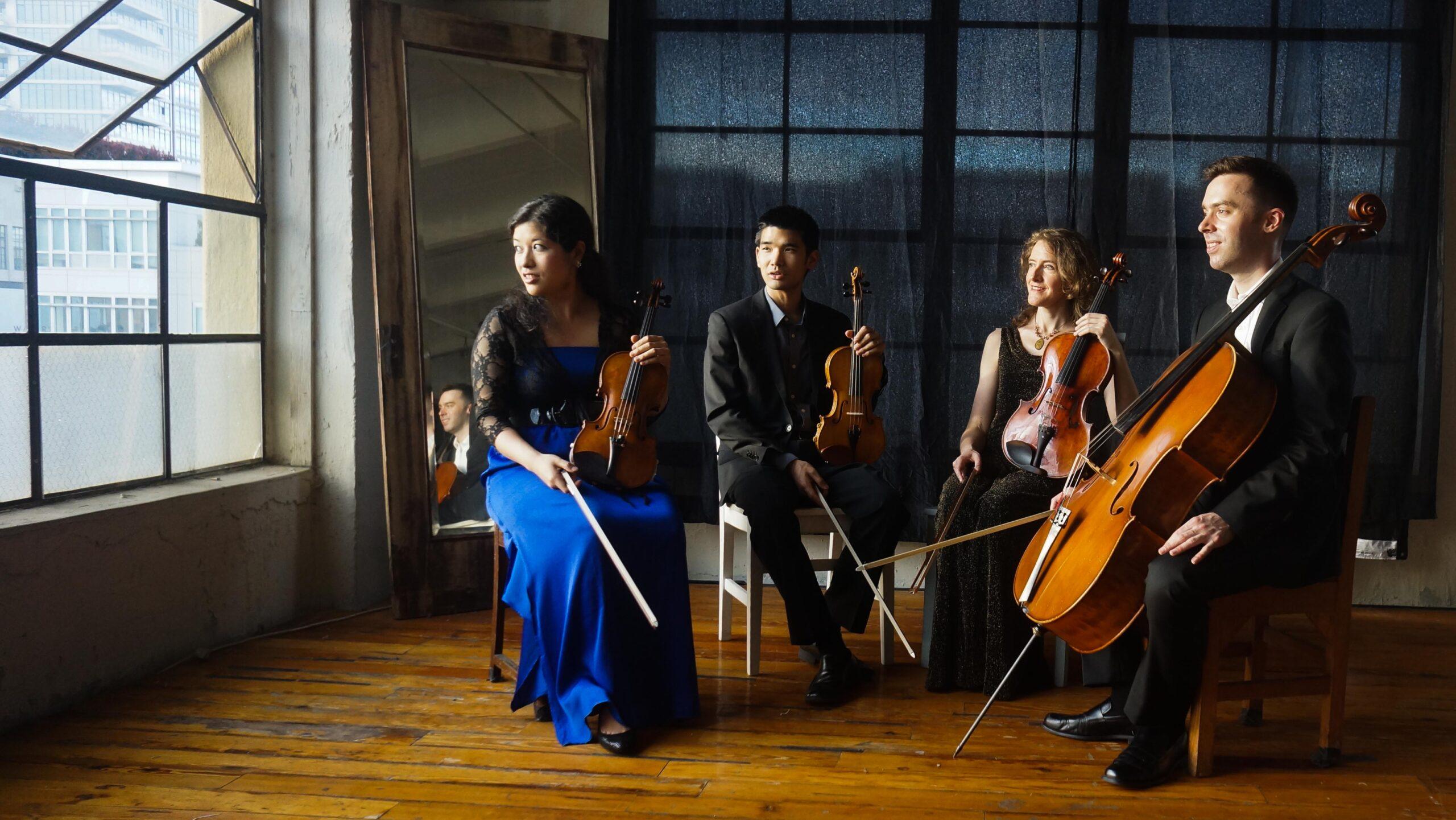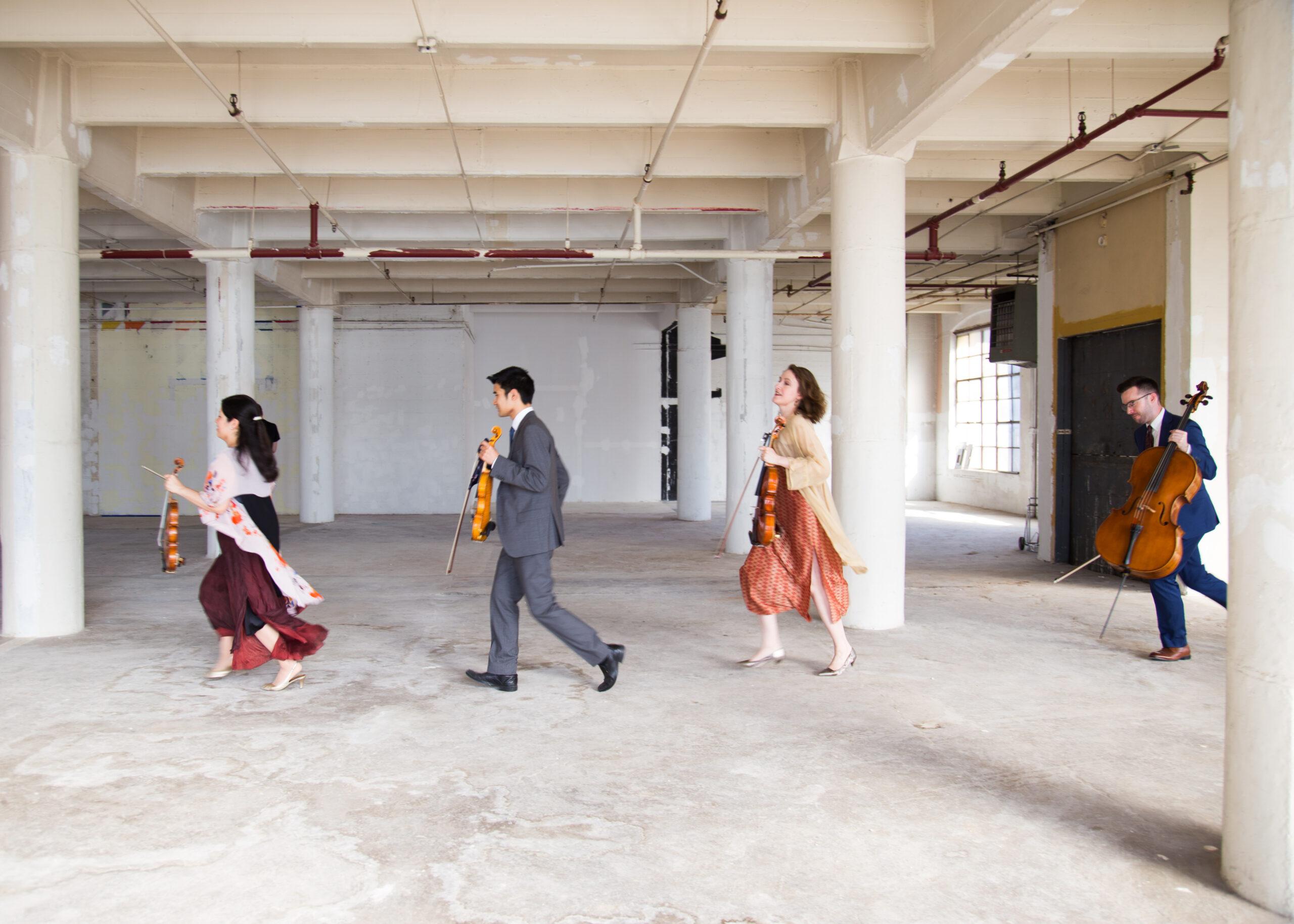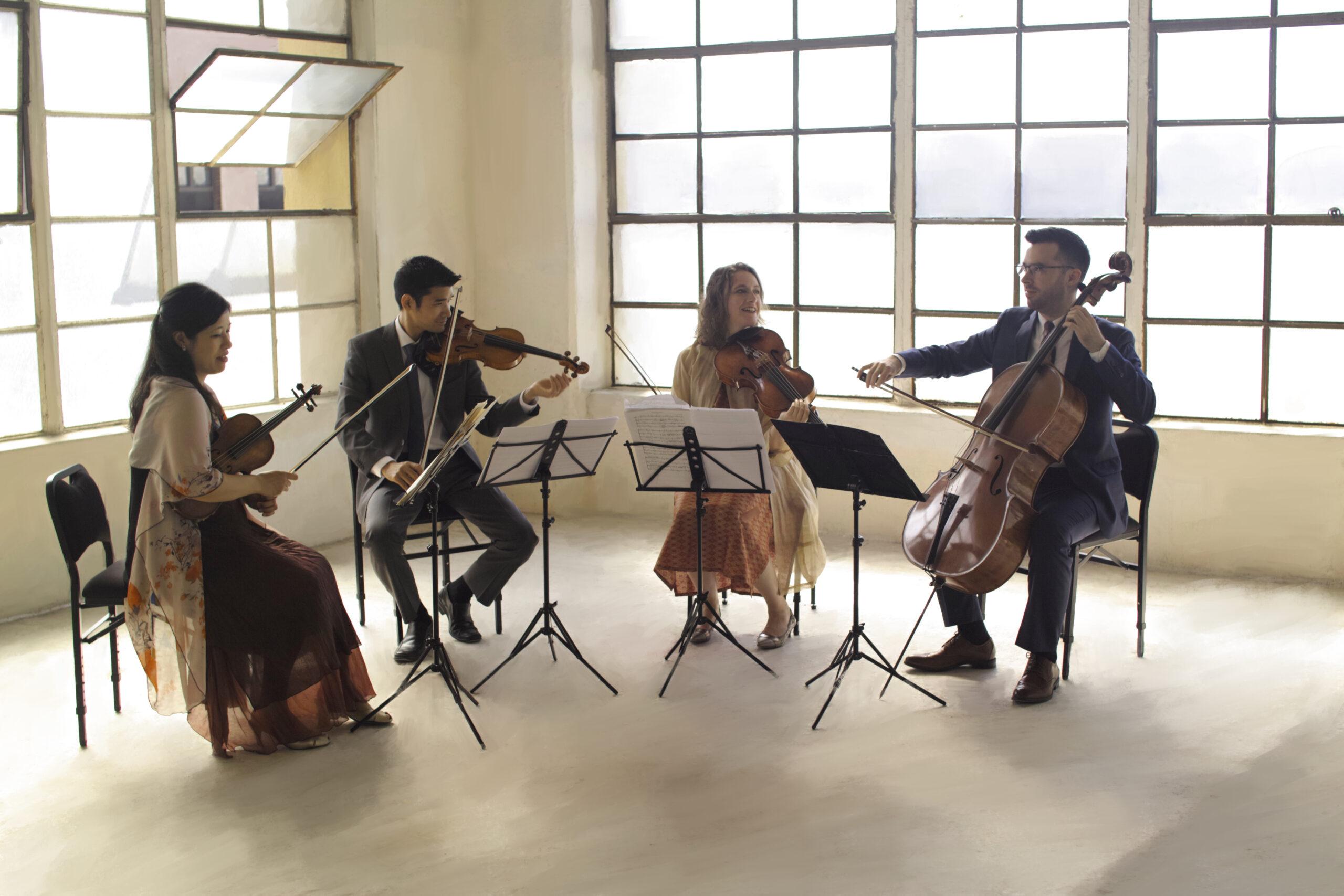TICKETS – $15 General Admission / $10 for BMCM+AC members + Students w/ID
On Thursday, October 16 the Momenta Quartet pays tribute to the groundbreaking musical legacy of Black Mountain College with a program of modernist works by two of its most iconic American composers: Stefan Wolpe (1902-1972) who was Music Director of Black Mountain College from 1952 through 1956, and John Cage (1912-1992) who taught there in the summer of 1948 and 1952 and was in residence is the summer of 1953. Momenta will open the program with two works written in 1950: Wolpe’s Set of 12 Pieces for String Quartet which the group premiered after it was transcribed from manuscript by the Stefan Wolpe Society, and John Cage’s String Quartet in Four Parts (1950). They will close the program with one of Wolpe’s late works, his String Quartet (1969).
This event is presented in conjunction with the exhibition Points in Space: Performance at Black Mountain College. The Momenta Quartet will also perform as part of Aphorisms, a Tribute to Ursula Mamlok, on Tuesday and Wednesday, October 14th-15th. Learn more about the Aphorisms performance here.
Momenta: the plural of momentum – four individuals in motion towards a common goal. This is the idea behind the Momenta Quartet, whose eclectic vision encompasses contemporary music of all aesthetic backgrounds alongside great music from the recent and distant past. The New York City-based quartet has premiered over 200 works, collaborated with over 250 living composers and was praised by The New York Times for its “diligence, curiosity and excellence.”
From the outset, Momenta treated all music equally, devoting as much time, care and commitment to the student works as to the imposing musical monuments. Today, Momenta’s educational-performing circuit includes Binghamton, Brown, Columbia, Cornell, Harvard, Hawaii Pacific, Michigan State, New York, Temple, Tufts, Washington and Yeshiva Universities; Bard, Barnard, Bates, Haverford, Hunter, Ithaca, Lehman and Williams Colleges; and Boston, Cincinnati, Eastman and Mannes conservatories. Momenta has received commission grants from the Koussevitzky, Barlow, and Jerome Foundations, and a Chamber Music America commission for Alvin Singleton, whose resulting work, “Hallelujah Anyhow” (2019), is featured on their 2022 album of his complete string quartets. Deeply committed to the musical avant-garde of the developing world, Momenta has premiered and championed the works of Tony Prabowo (Indonesia), Cergio Prudencio (Bolivia) and Hana Ajiashvili (Georgia); has collaborated with numerous gamelan ensembles; and in 2018, was brought by the U.S. Department of State and U.S. Embassy La Paz to Cochabamba, Bolivia for new music concerts and a teaching-performing residency at the Instituto Laredo.
Momenta has appeared at such prestigious venues as the Library of Congress, National Gallery of Art, the Smithsonian’s Freer Gallery, Rubin Museum, Miller Theatre at Columbia University, the Princeton Institute for Advanced Study, Chamber Music Cincinnati, and the Louisville and Philadelphia Chamber Music Societies. Festival credits include the renowned Cervantino Festival in Mexico; MATA; Music from Japan; Ostrava Days in the Czech Republic; Red Note New Music; the Smithsonian’s “Performing Indonesia”; the Yellow Barn Artist Residency; and since 2015, the quartet’s own annual member-curated Momenta Festival in New York City, featuring world premieres, guest artists, and samplings from Momenta’s unique personal repertoire.
Momenta has recorded for the Albany, Bridge, Centaur, Furious Artisans, Innova, Navona, New Focus, New World and PARMA labels; and has been broadcast on WQXR, Q2 Music, Austria’s Oe1 and Vermont Public Radio. The quartet’s latest album “Alvin Singleton: Four String Quartets” was released to critical acclaim in 2022 by New World Records. Their debut album, “Similar Motion,” featuring visionary works by Debussy, Philip Glass and Arthur Kampela, is available on Albany Records. Upcoming recording adventures include a project to record all thirteen string quartets by Mexican microtonal maverick Julián Carrillo (1875-1965) for Naxos, the complete string quartets of Roberto Sierra, and an American album featuring diverse works by Elizabeth Brown, Jason Hwang, Shawn Jaeger, Yusef Lateef, and Matthew Greenbaum.
Lauded by the New York Times as “brilliant” and by The Strad for her “marvellous and lyrical playing,” violinist Emilie-Anne Gendron enjoys an active and versatile freelance career based in New York. A deeply committed chamber musician, Ms. Gendron has been on the roster of the Marlboro Music Festival and the touring Musicians from Marlboro since 2011. She has appeared frequently with Talea Ensemble, A Far Cry, Argento Ensemble, Sejong Soloists, and has served on numerous occasions as concertmaster of ensembles including Orpheus, IRIS Orchestra, and Chamber Orchestra of Philadelphia. She is a founding member of Ensemble Échappé, a new-music sinfonietta, as well as the Gamut Bach Ensemble, in residence with the Philadelphia Chamber Music Society. Ms. Gendron’s extensively varied international appearances have included recitals in Sweden and at the Louvre in Paris; festivals in Russia, Finland, and Jordan; and recently, major venues in China, South Korea, Argentina, Chile, and Colombia. She was trained at the Juilliard School where her teachers were Won Bin Yim, Dorothy DeLay, David Chan, and Hyo Kang. A dual U.S.-Canadian citizen, she holds a B.A. in Classics from Columbia with Phi Beta Kappa honors, and a Master of Music degree and the coveted Artist Diploma from Juilliard. www.emilieannegendron.com
Praised by The New York Times as “spellbinding,” violinist Alex Shiozaki is emerging as a strong advocate for the music of today. At home with music new and old, he has appeared as a soloist with orchestras including the Sapporo Symphony, Sendai Philharmonic, AXIOM Ensemble, and the Juilliard Orchestra. Other highlights include summer residencies at the Tanglewood Music Center as a New Fromm Player and a Japan tour with the Metropolitan Opera Orchestra. A member of the Momenta Quartet since 2016, he also regularly performs with the IRIS Orchestra, Contemporaneous, and Mimesis Ensemble. As part of the Shiozaki Duo with his wife and pianist Nana Shi, Alex has given recitals in New York, Boston, Washington D.C., and California. Holding a B.A. from Harvard College and an M.M. and D.M.A. from the Juilliard School, he counts among his teachers Ronald Copes and Joseph Lin of the Juilliard String Quartet, Lynn Chang, and Robin Sharp. In addition to his performance activities, he is on faculty at the Juilliard School, State University of New York at New Paltz, and Interlochen Center for the Arts.
Stephanie Griffin is an innovative violist and composer with an eclectic musical vision. Born in Canada and based in New York City, her musical adventures have taken her to Brazil, Mexico, Indonesia, Singapore, Japan, Hong Kong, England, Ireland, France, Germany, Belgium, Spain, Italy, and Mongolia. Stephanie founded the Momenta Quartet in 2004, and is a member of the Argento Chamber Ensemble and Continuum; principal violist of the Princeton Symphony; and viola faculty at Hunter College. She was a 2019 Composition Fellow at the Instituto Sacatar in Brazil, and has received prestigious composition fellowships and commissions from the Jerome Foundation, the New York Foundation for the Arts, the New York State Council on the Arts and the Bronx Council on the Arts. As an improviser she has performed with Henry Threadgill, Wadada Leo Smith, Butch Morris and Adam Rudolph, among others, and was a 2014 Fellow and 2021 Alumna-in-Residence at Music Omi. She holds a Doctor of Musical Arts degree from The Juilliard School where she studied with Samuel Rhodes, and has recorded for Tzadik, Innova, Naxos, Aeon, New World and Albany records. Since August 2020, she has served as the Executive Director of ACMP, a nonprofit organization providing grants and services for amateur chamber music worldwide.
Michael Haas is an accomplished and exciting cellist, performing in New York City and around the world. His playing has been described as “refined and attractive” by the New York Times. Leading a varied musical life, Michael is equally at home performing chamber music and orchestral repertoire both old and new. He has recently appeared performing at Symphony Space, the New York Live Arts Theater, Le Poisson Rouge, as well as for Tertulia, a new series bringing chamber music to intimate settings around New York City. In addition to his work with Momenta Quartet, he performs regularly with the Princeton Symphony, New Jersey Symphony, and American Ballet Theater Orchestra. He holds degrees from the Curtis Institute of Music and the Juilliard School.
John Milton Cage Jr. was an American composer and music theorist. Cage taught at Black Mountain College in the summers of 1948 and 1952 and was in residence during the summer of 1953. A pioneer of indeterminacy in music, electroacoustic music, and non-standard use of musical instruments, Cage was one of the leading figures of the post-war avant-garde.
Cage’s influence on Black Mountain was significant. It was his recommendation of Lou Harrison in 1952 that assured a role for the most avant-garde music at the college. On his visits, David Tudor performed music by Arnold Schoenberg, Morton Feldman, Stefan Wolpe, Anton Webern, Henry Cowell, Pierre Boulez, Christian Wolff, Lou Harrison, and, of course, John Cage. Although Cage had few students, his comment that the most important teaching took place in the dining hall captures the essential of Black Mountain. One can only imagine the lively and challenging exchange of ideas and the undocumented impact of these conversations on the work of the participants.
The influence of Black Mountain College on John Cage was profound. At the college, he came into contact with individuals who were to be his physical, intellectual and spiritual community for the remainder of his life. Some were to be close friends and collaborators; with others he was to have more peripheral associations. The Land, where he lived from 1954 until he moved back into New York City, provided him with an extended family celebrating holidays, birthdays and other occasions. At a point in his career when he became increasingly alienated from his peers, this community of kindred spirits was a critical support. Black Mountain College was for Cage and others a touchstone, a shared bond, and an instant act of recognition and inclusion.
Above are excerpts by Mary Emma Harris from her Cage biography in the BMC Yearbook and her article “John Cage at Black Mountain” in Volume 4 of the Journal of Black Mountain College Studies.
Throughout his life, Stefan Wolpe was a fearless musical explorer. As a young man in Berlin during the Weimar Republic, he took up the cause of socialism and committed himself to a life in music. During the 1920s, he became both a member of the radical Novembergruppe and a proponent of Busoni’s “Young Classicism.” He composed workers’ songs and anti-fascist theater music alongside complex atonal concert music.
Inspired by visual forms, he embraced the dadaists’ art of juxtaposition and studied at the Bauhaus. Forced to flee from Nazi Germany in 1933, he settled for four years in Palestine, where he studied Arab musical structures and forms as well as atonal and twelve-tone techniques.
In 1938, he started anew again, this time in the United States. After WWII, he entered the circle of New York abstract expressionist painters and attended meetings of the Eighth Street Club.
As director of music at Black Mountain College (1952-6), he galvanized a youthful, artistic community, as he had at the Bauhaus and on the kibbutzim in Palestine. During the sixties, he inspired a new generation of American composers and performers. He was a teacher and mentor to jazz musicians, modernist composers, and artistic avant-gardists alike.
During his last years, he was no longer altogether an outsider; but he was diagnosed with Parkinson’s Disease in 1964. Even as it became almost impossible for him to notate music by hand, he continued to compose. He died in New York on 4 April, 1972.
Above excerpts from the Stefan Wolpe Society.
